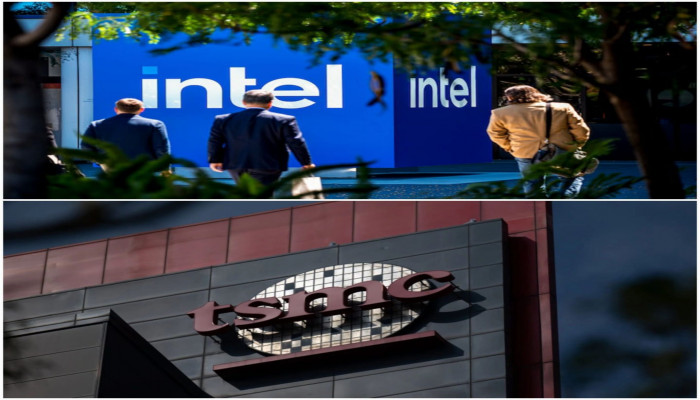Trump team urges TSMC to operate Intel’s US factories
- In Reports
- 06:46 PM, Feb 15, 2025
- Myind Staff
According to a source familiar with the discussions, Taiwan Semiconductor Manufacturing Co. (TSMC) may take a controlling stake in Intel Corp.'s factories at the request of Trump administration officials. The move is part of the administration’s efforts to strengthen American manufacturing and maintain the country’s leadership in critical technologies.
The discussions are still in the early stages, and the structure of the potential partnership has not yet been determined. If the plan moves forward, TSMC—the world’s largest contract chipmaker—would completely control Intel’s U.S. semiconductor factories. This could also help address Intel’s financial struggles, which have led to job cuts and a slowdown in its global expansion.
One possibility is involving prominent U.S. chip designers as equity stakeholders and financial backing from the U.S. government. This would ensure that the venture is not entirely foreign-owned. TSMC currently manufactures chips for companies like Apple and Nvidia, which are essential for AI technology.
Despite the potential benefits, the deal may face political obstacles similar to those seen in the stalled acquisition of U.S. Steel by Japan’s Nippon Steel. A White House official stated that the president is unlikely to support a foreign company taking control of Intel’s factories.
TSMC and Intel, based in Santa Clara, California, declined to comment.
Intel’s stock recovered some losses on Friday after Bloomberg reported on the potential discussions with TSMC. The company’s shares dropped as much as 5.3% earlier in the session and ended the day down 2.2% at $23.60 in New York.
Despite facing increasing competition over the past five years, Intel remains the leading manufacturer of key components used in personal computers and servers. It also operates the largest and most advanced semiconductor production network owned by a US-based company. These factories have gained strategic importance as the US government pushes to bring semiconductor manufacturing back from Asia.
Under its former CEO Pat Gelsinger, Intel launched an ambitious and costly plan to regain its leadership in chip manufacturing. The company secured $7.9 billion in US government funding for projects across four states and $3 billion specifically for military chip production. The funds are being gradually disbursed as Intel meets specific production milestones, with $2.2 billion already received in January.
However, Intel has struggled to attract enough external customers to justify its investments, particularly at a new facility in Ohio. At the same time, the company’s own market share has been shrinking, putting additional financial strain on its operations just as it faces high costs. Due to these challenges, Intel’s board lost confidence in Gelsinger’s turnaround strategy, leading to his departure in December.
Despite Intel's assurance to invest in US factories, Washington officials have explored backup plans for months. Interestingly, according to Bloomberg, some members of the Biden administration have been considering a potential partnership between Intel and GlobalFoundries Inc. as a viable option.
A potential deal between Intel and GlobalFoundries was briefly considered, which would have combined Intel’s advanced chipmaking capabilities with a company specialising in older-generation semiconductors. However, discussions never exceeded an initial idea since GlobalFoundries had moved away from cutting-edge manufacturing years ago and lacked the financial resources to acquire.
Meanwhile, officials from the Biden administration suggested an alternative approach—having TSMC license its chip manufacturing technology for use at Intel’s factories. However, multiple sources indicated that TSMC was unwilling to support a deal that could strengthen a competitor. Additionally, Biden’s team was generally hesitant to intervene in such negotiations directly.
In contrast, Trump has been more proactive in deal-making and TSMC, which recently held its board meeting in the U.S. for the first time, appears keen to maintain a positive relationship with the new administration.
Trump has repeatedly accused Taiwan of undermining the US semiconductor industry and threatened tariffs on foreign-made chips. Unlike Biden’s approach of offering government subsidies to boost domestic chip production, implemented through the 2022 CHIPS and Science Act, Trump has favoured using tariffs to encourage US-based manufacturing. The CHIPS Act led to TSMC securing $6.6 billion in grants to help build three semiconductor plants in Phoenix.
Trump’s first administration initially took steps to attract TSMC to the US, and key officials from his team have consistently emphasised their dedication to strengthening domestic manufacturing. This focus has been extreme regarding technologies central to the ongoing competition between the U.S. and China.
Vice President JD Vance stated at an AI summit in Paris that the U.S. “will ensure that the most powerful AI systems are built in the US with American-designed and manufactured chips.”
TSMC’s willingness to consider a deal with Intel marks a shift in its stance from a few months ago. In October, CEO C.C. Wei told analysts that the company was not interested in acquiring Intel’s factories. However, when asked the same question in January, Wei avoided a direct response, saying, "They are our very good customers. I like them and they are very important to TSMC’s business also. That’s all I can say."







Comments